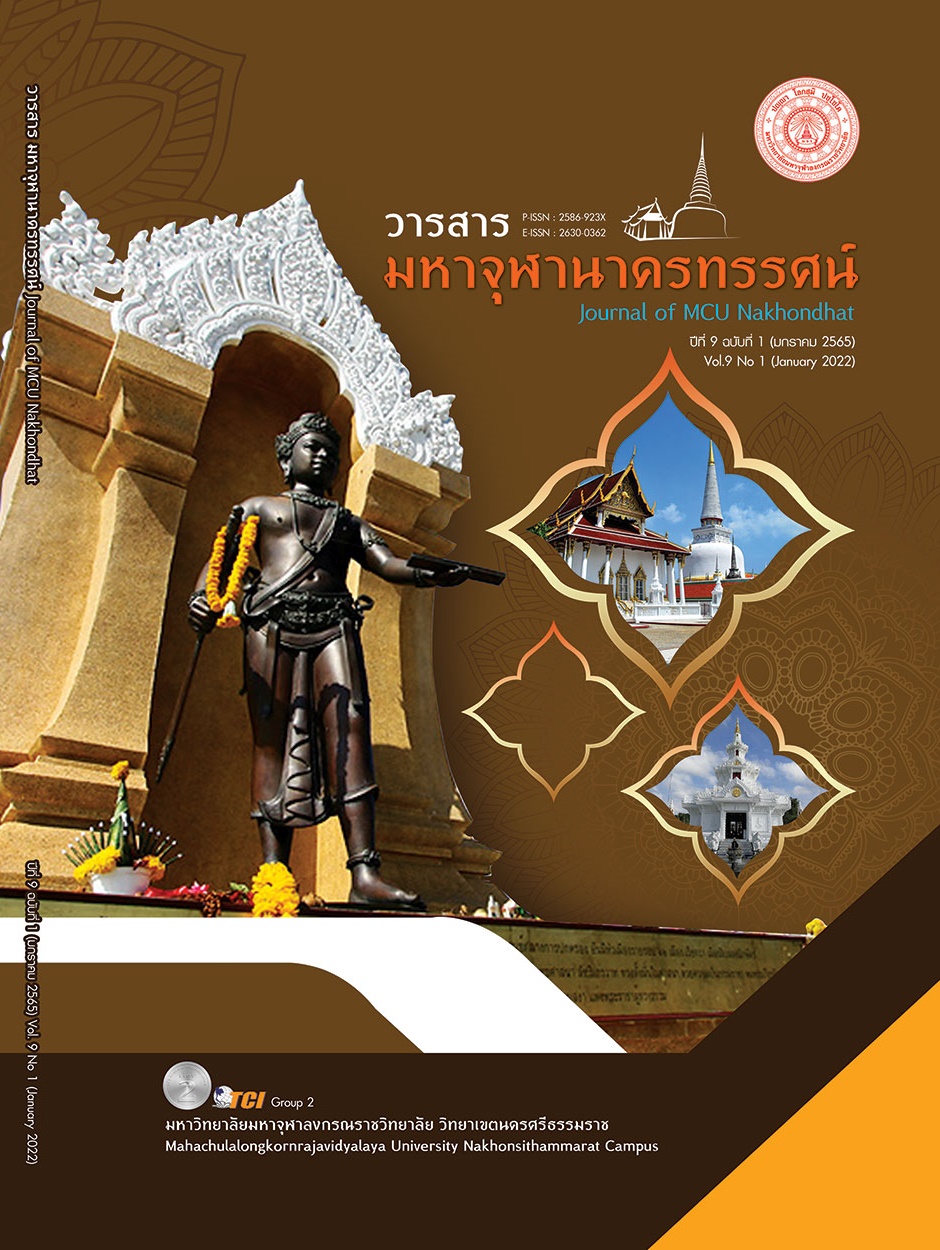PREDICTING NURSING STUDENTS’ GRADE POINT LEVEL WITH MARKOV CHAIN
Main Article Content
Abstract
The objectives of this research article were to predict the number of students in each score level for the next semester from the changed in the score level of the previous 6 semesters using the Markov chain method which assuming that future changes in the score level will tend to change as in the past. The Markov chain method is using the previous state of change in order to predict the next subsequent states, if changes pattern in the future will tend to have the same pattern of change as in the past. Using the research model that gathered the average score of 96 undergraduate nursing students in the regular semesters from the Year 1, 2 and 3, the total of 6 semesters between the academic years 2018 and 2020. Each semester score was classified into 4 levels, and the status transition probability matrices were generated to predict the number of students at each grade level in the next semester. The results showed that the Markov chain method forecasted difference from the actual in the academic year 2019 to 2020 when using 2018 to 2019 transitions, due to the teaching method had been changed from onsite to online according to the situation of COVID-19 and the difference in the proportion of theoretical and practical courses of different academic years. But if the situations proceed as it used to, the subsequent state will follow the Markov process that continues in accordance with the previous probability transition matrix. Therefore, if the teaching arrangements in the academic year 2021 are not different from the practices in the year 2020, and the combination of lecture subjects and practicum subjects for the fourth year are not much different from the combination in third year subjects, the Markov chain predicted that this group of students for academic year 2021 will have better score levels than the previous academic year 2020.
Article Details

This work is licensed under a Creative Commons Attribution-NonCommercial-NoDerivatives 4.0 International License.
References
คณะพยาบาลศาสตร์ มหาวิทยาลัยปทุมธานี. (2560). หลักสูตรพยาบาลศาตร์บัณฑิต ฉบับปรุง พ.ศ. 2560. เรียกใช้เมื่อ 6 สิงหาคม 2564 จาก https://drive.google.com/file/d/1KvgRlqsnw aqyjze7X-jo4yDPBjJkXySk/view
ปฏิวิชช์ สาระพิน และคณะ. (2558). การศึกษาความสัมพันธ์ระหว่างการเปลี่ยนแปลงการใช้ประโยชน์ที่ดินกับสมดุลน้ำ ในพื้นที่ชุ่มน้ำบึงบอระเพ็ดด้วยแบบจำลอง Soil and Water Assessment Tool. วารสารวิชาการวิทยาศาสตร์และเทคโนโลยี มหาวิทยาลัยราชภัฎนครสวรรค์, 7(7),125-42.
อภิศักดิ์ วิทยาประภากร และคณะ. (2560). การวิเคราะห์ราคาทองคำแท่งด้วยวิธีห่วงโซ่มาร์คอฟ. วารสารวิชาการเทคโนโลยีอุตสาหกรรม, 13(3), 48-58.
Baudoin, F. (2010). Stochastic Processes. International Encyclopedia of Education.(3rd ed.), 3(2), 451-452.
Egbo, M. et al. (2018). Markov Chain Approach to Projection of Secondary School Enrolment and Projection of Teachers. Open Journal of Statistics ,2018(8), 533-555.
Jayathavaj, V. & Boonya, P. (2019). Using Markov chains to forecast the proportion of noncommunicable diseases. Songklanakarin Journal of Science Technology, 41(5), 1124-1130.
Jayathavaj, V. et al. (2021). Analysis of University Students’ Grade Point Average Before and After COVID-19. In Proceeding of the 8th National and International Conference on Economics Social and Health Survival in the New Normal (pp.8-9). Pathumthani. Pathumthani: Pathumthani University.
Mavruk, C., & Kiral, E. (2016). Academic Progress of Students in Quantitative Courses at Nigde University Vocational School of Scocial Sciences a Prediction using Markov Model. Ömer Halisdemir Üniversitesi İktisadi ve İdari Bilimler Fakültesi Dergisi, 9(3), 267-276.
Paxinou, E. et al. (2021). Analyzing Sequence Data with Markov Chain Models in Scientific Experiments. Retrieved August 2, 2021, from https://doi.org/10.1007/s42979-021-00768-
Taha, H. A. (2018). Operations research an introduction (10th ed.). Upper Saddle River. NJ: Prentice-Hall.
Wang, L. et al. (2021). Using Markov chain model to evaluate medical students’ trajectory on progress tests and predict USMLE step 1 scores---a retrospective cohort study in one medical school. Retrieved August 21, 2021, from https://doi.org/10.1186/s12909-021-02633-8
Win, A. P. (2018). Prediction of Students’ Grades in Near Future Based on Markov Chains. In Proceeding of the 2nd Conference on Computer Applications and Research. University of Computer Studies (Taunggyi).
Yutong, Z. (2021). Applications of Markov Chain in Forecast. Journal of Physics: Conference Series, 1848(1), 1-5.


